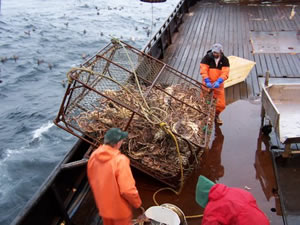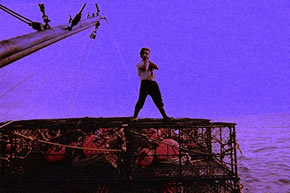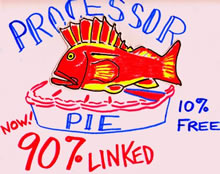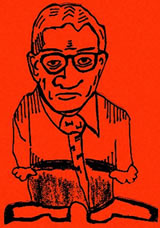
 |
The Deadliest EarmarkThe Dark and Dirty Side of the Bering Sea Story You Won't See on the Discovery ChannelBy Terry Haines 
And it was here, in 2002, far from prying eyes, that the North Pacific Fisheries Management Council gathered to give away a piece of America. We have all watched it. Wintertime in the Bering Sea, as seen on TV. Far offshore hundred foot boats hauled the deadliest catch over icy rails for armchair clutching audiences. What the deckhands didn't know as they caught crab for the cameras was that in Dutch Harbor comfortable men sitting around folding tables had captured something from them. Their very way of life, and three quarters of their paychecks. The Council is a federally created body with near absolute power over everything in the North Pacific that swims or crawls within two hundred miles of America. Unfortunately, like all the Regional Fishery Councils, it has shown itself susceptible to corporate takeover. Gradually, but insistently, paid lobbyists representing a cartel of multinational corporations came to dominate the Council through a series of questionable appointments. Once in power they got right to work. The Frankenstein law they stitched together privatized a public resource worth hundreds of millions of dollars and provided ninety percent of the crab to the cartel, enriching their clients immensely. Reflecting on his time in office, Alaska Governor Tony Knowles would say his greatest regret was his part in what happened that day. But at the moment the room was simmering with victory. They had done it! Crab Rationalization or "Crab Ratz", featuring a federally funded boat buyout, a mandated market monopoly and the conversion of three species of crab into private ownership, was ready for earmarking. Yes, certainly, it would never survive real Congressional scrutiny. It would have to be brought through a backdoor as an earmark. So they used biggest backdoor in the Senate, Alaska's Ted Stevens. 
Compared to their infiltration of the Council, the seduction of Senator Ted was a relatively simple affair. Jet rides and generous campaign contributions set the table for the true tribute: over nine hundred thousand dollars in "consulting fees" and kickbacks paid to the Senator's son, Ben Stevens, for various favors, including the implementation of the Ratz. (As reported by Alaskan watchdog Ray Metcalfe) Read Metcalfe's documentation (PDF) . But with Ratz the Senator had his work cut out for him. Ratz would have to be snuck through the Commerce Committee, chaired by the pesky Senator McCain who had already expressed his disapproval. If McCain caught this creature in the open, he would kill it. The sly Senator Stevens waited until McCain was absent from Commerce, attending to the nation's pressing security needs. Then he threw a trenchcoat over the shoulders of Ratz, rushed it through the committee and earmarked it onto a federal spending bill. When he was challenged later about the shadowy route of the "crab rider" Senator Stevens put on his Hulk tie and his Appropriations hat and threatened to smash the federal funding for all the other earmarks, whether for horse's hospices or hero's hospitals. The opposition hid their heads. The earmark stuck. The resulting law has created a paradigm shift in the industry. The multinational fish processors own the market, giving them the control they always wanted. They now say when to fish, where to deliver and what the price will be. And the former boat owners who inherited the crab now can sit on shore and charge fishermen fifty to seventy percent of the ex-vessel price as an "access fee". One year after Ratz working king crab fishermen saw their shares reduced by three quarters. Here's how a crab deckhand described it in a letter to Alaska's Governor Palin, who recently called commercial fishing "the economic and social heart of our coastal communities": Dear Governor Palin: Like you, I am a commercial fisherman. I have spent half my life as deckhand and engineer on some of the highest producing crab boats in the Bering Sea. And since a review of Crab Rationalization was on the agenda of the December meeting of the North Pacific Fisheries Management Council I joined some of the braver crewmen in Anchorage to give them a "report from the front lines". We told them that, for working fishermen like us, Crab Ratz is a disaster. A great injustice has taken place in Alaska. My experience attending these meetings has led me to believe that those who had money to hire lawyers and lobbyists took advantage of working fishermen like us. They spent years working on how to own a public resource while we were at sea harvesting it. We did our jobs and expected public servants to do right by us. That was our mistake. Having said that, I have much greater faith in the newly remodeled Council. I'm just afraid they are trying to shut the crab pot door after the crabs have escaped. We crewmen need help. I am now spending far more time on the water for considerably less pay. Crab Ratz has pushed my life down like a sinking ship. I am trying desperately just to keep afloat. The double whammy of less pay for more time at sea has seen my retirement reserve dwindle, my personal equity evaporate and has meant sacrificing what is most important to me: time with my family. It seems ironic that the very injustices of Ratz, that it threw nine hundred of us out on the street and exiled the rest to the Bering Sea for one quarter share, make it that much less likely that we can afford represent ourselves. We are too busy trying to feed our families. And when we do get time off we want to spend it with them, not attending meetings at great expense uselessly asking for justice. Plus every one of us who speaks up risks his livelihood. It is no secret that talking in public about crew issues is not good on your resume when you show up to ask for job next year. 
Others who have claimed to speak for the industry, quota share owners linked in 'Co-Ops" that mass the quota into huge blocks, don't need to own a pair of rubber boots, or even a boat. They can sit on shore (most no longer live in Alaska) and charge working fishermen like me seventy percent as a "lease fee". So all of us actually working in the industry, including skippers crew and boat owners, have seventy percent of the value skimmed off before we get our share. Next year some will sign contracts for eighty percent. This bleeding of the value of the crab hurts Alaska and is eroding our culture. Fishermen are Alaskan independent contractors working at sea in a culture that for generations has been built on hard work, courage, and honesty. Our fishing towns are good places to live because of our culture- our way of life. That's what rationalization threatens: our way of life. I want to be as good a friend as I can be, as loving and compassionate to my fellow man as I can and to care for my own family. When you take away time and money people can no longer help out at their churches or put their kids through school. Being fairly paid means I am empowered as a good citizen. I sure don't feel powerful at the NPFMC meetings. And those who are seem less concerned with being good citizens than with their own self interests. The past year has shaken my life to its foundations. As I write this with my children playing around my feet I'm having a hard time even finishing it. I may soon be a ruined man.
This Council could fix Crab Ratz so it works for Alaskans. I am asking for your leadership to help make this happen. Father, ex-husband, son, uncle, brother, friend and fifth generation Alaskan. Alaska's Governor is an honorable lady who is making Alaskans feel proud again. She has called Alaska's rampant influence peddling a "culture of corruption". The FBI apparently agrees. Prominent state legislators have already been convicted in an ongoing federal investigation that seems to swirl all around Ben Stevens and the large sums of money he has received for the work he has described as "consulting". An oil industry executive recently testified in court that his company bribed the younger Stevens generously to influence legislation, at the same time it contributed generously to the senior Stevens' campaign fund and used company workers to remodel his house.  In their investigation of fisheries corruption the FBI has subpoenaed records from many of the major players, including processors and both Ben and Ted Stevens. All the sordid details of how Crab Ratz really came to be may very well come out in court testimony. But will it be too late for the fishermen? Crewmen have recently come forward to the Council with an idea for a pool of quota that fishermen could access without the lease fee, and sell in a free market. But they are caught between the Scrooge and Marley of quota owners and processors, neither of whom want to part with the windfall for which they planned and paid so long. Even now as waves of snow crab scramble ever each other under the edge of the sheet ice they are earmarked. Thanks to our Senator Stevens they are branded with a corporate logo even before they tumble into the crab pots. And Senator Stevens has clipped an earmark onto Alaska's working crabbers, too. It reads: "Expendable" © AlaskaReport News and Terry Haines - Posted January 18, 2008 Terry Haines is a Kodiak deckhand and representative for Fish Heads, an advocacy group dedicated to preserving the vitality of Alaska's fishing communities. Contact Terry Haines AlaskaReport's ongoing corruption coverage:Corrupt Bastard Club coverage and links A Culture Club of Corrupt Bastards - by Terry Haines Lesil McGuire made "veiled threats" against witness: FBI Pete Kott guilty of bribery, conspiracy, and extortion Ted Stevens implicated in bribery during Kott trial Ben Stevens has accepted bribes - by Ray Metcalfe Ted Stevens under criminal investigation for corruption Ted Stevens & Corruption: Move Over Duke Cunningham Legislators still stumping for VECO - By Ray Metcalfe Alaska fishermen shout at Ted Stevens in Kodiak. Stevens lated lied to a reporter and denied the incident occurred. He hadn't realized it was filmed. |